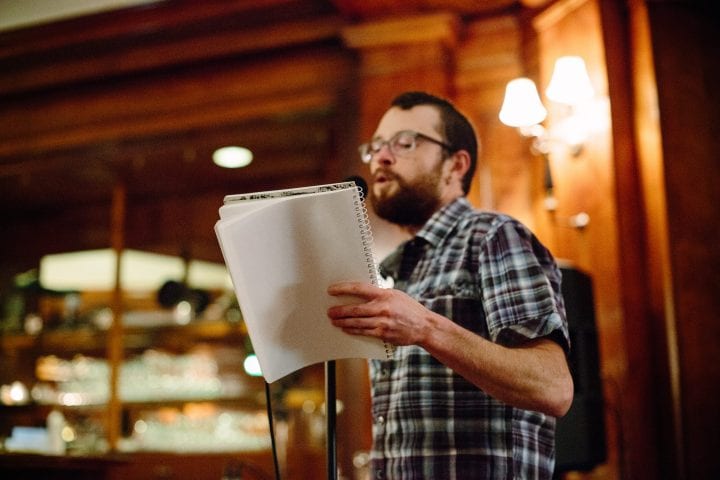
WITS Voices: Coming Out Trans While Teaching
May 2, 2018
By Cody Pherigo, WITS Writer-in-Residence
I had the opportunity to come out as transgender in my classrooms this year, an action that was never on the table when I was in high school and still isn’t for students and teachers in most areas of the country. Seattle is special, sometimes. But, it is still scary to actually come out in high school, whether teacher or student.
One of the main reasons it was worth it for me: there were a couple trans (and several queer) students in class, and it’s crucial that they see themselves at the front of a classroom, behind a mic, and as strong, confident leaders. Another reason: the 60+ cisgender and straight students who were listening to me, more or less, may internalize that trans people are human, and not monsters who creep around in bathrooms, as many state initiatives tell it. And, when I come out like that, I become less a monster to myself, and join in solidarity with an extensive lineage of trans artists and writers. And, it is in my job description, both as a WITS Writer and as a spiritual animal: Model risk. Give permission. It is a mixture of pride and terror… kind of like revising a poem.
The second time I came out, in a 9th grade General Writing class, was in the midst of a lesson on “Political Poetry.” Though I think the lesson failed in several ways, coming out was worth it. Lesson failures: I forgot to mention the existence of poet laureates at local, state, and national levels; I failed to point out that our featured poet, Andrea Jenkins, is also the first openly trans Black woman elected to public office—Minneapolis City Council; and the lesson resembled a civics class more than a creative writing class. I did remember to say, “Political poetry talks back.” I played a video of Andrea reading her poem, “A Requiem for the Queers (or why we wear the color purple)” while donning my grandfather’s purple shirt. I told the class that I met her a few years ago at a trans conference, and during a conversation she said: “Poets are politicians,” as in: wielders of words, for a particular purpose. That moment launched a lesson plan and renovated my poetic-political orientation. After the video, students worked on an exercise designed to tease out what issues of identity or political salience they wanted to “talk back” to, and then write a longer manifesto-like response.
One of my primary tools for teaching social justice objectives is to curate a representational curriculum—we read work from writers who are queer, trans, people of color, and/or immigrants, etc. I offer bios and videos of writers because the image of a writer, the sound of their voice, and the original and sometimes surprising (to the listener) story they share all make room for a meaningful revision of judgments.
That’s the set up at least. The first time I came out, in a 9th-12th grade Creative Writing class, was via the vehicle of a “Judge Me” exercise, which WITS Writer Danny Sherrard blogged about in November 2017, and is like amateur surgery—on the first day of class you ask students to call out their judgments (or observations and impressions) of you, the teacher (e.g. you’re nervous, you’re not a real teacher, you’re working class, etc.), and you confirm or amend those judgments. You tell your story, piece by piece.
I realized though that I prefer to come out at a different angle, after a few classes, once I’ve gotten past first day jitters and can stitch it into a context where students can find room for themselves as well, and we can all perhaps take a step closer to empathy for one another, and for the politics on our bodies. My experience as a trans person is the emotional landscape of translation that I come back to over and over again to connect with an “other.” That’s my deepest place of listening. It’s where my writing comes from.

Cody Pherigo first practiced poetry at Bent Writing Institute, and later received an MFA at Goddard College. He was a 2016 Ruth Stone Poetry Prize finalist and 4Culture Artists Grant recipient. Cody teaches at WITS and Richard Hugo House. His poems are published or forthcoming in Atlanta Review, THEM, The James Franco Review, Milk Sugar, and Gay City: Volume 6. Cody self-published two chapbooks: Blue Thunder Children (2011) and Animal’s Sabbath (2013).